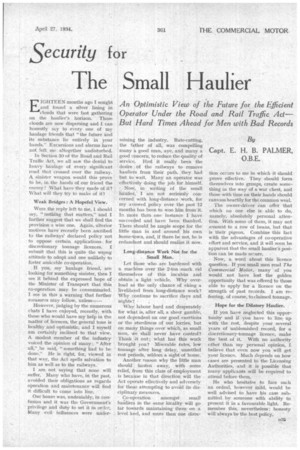Security for
Page 101

If you've noticed an error in this article please click here to report it so we can fix it.
The Small Haulier ier
Capt. E. H. B. PALMER, O.B.E.
EIGHTEEN months ago I sought and found a silver lining in clouds that were fast gathering on the haulier's horizon. Those clouds are now dispersing and I can honestly say to every one of my haulage friends that "the future and its substance lie entirely in your hands." Excursions and alarms have not left me altogether undisturbed.
In Section 30 of the Road and Rail Traffic Act, we all saw the denial to heavy haulage of every significant road that crossed over the railway. A sinister weapon would this prove to be, in the hands of our friend the enemy ! What have they made of it? What will they try to make of it?
Weak Bridges A Hopeful View.
Were the reply left to me, I should 3ay, "nothing that matters," and I further suggest that we shall find the provision a wise one. Again, ulterior motives have recently been ascribed to the railways' declared policy not to oppose certain applications for discretionary tonnage licences. I submit that this is quite the wrong attitude to adopt and one unlikely to foster amicable co-operation.
If you, my haulage friend, are looking for something sinister, then I see it behind the expressed hope of the Minister of Transport that this co-operation may be consummated. I see in this a warning that further measures may follow, unless—
However, judging by the numerous chats I have enjoyed, recently, with those who would have my help in the matter of licences, the general tone is healthy and optimistic, and I myself am certainly inclined to that view. A modest member of the industry voiced the opinion of many : "After all," he said, "something had to be done." He is right, for, viewed in that way, the Act spells salvation to him as well as to the railways.
I am not saying that none will suffer. Many who have, in the past, avoided their obligations as regards operation and maintenance will find it difficult to come into line.
Our house was, undeniably, in confusion and it was the Government's privilege and duty to set it in order. Many evil influences were under
mining the industry. Rate-cutting, the father of all, was compelling many a good man, aye, and many a good concern, to reduce the quality of service. Had it really been the • desire of the railways to remove hauliers from their path, they had but to wait. Many an operator was effectively doing the job for himself.
Now, in writing of the small haulier; I am not seriously concerned with long-distance work, for my avowed policy over the past 12 months has been to woo him from it. In more than one instance I have succeeded and have been thanked. There should be amplescope for the little Man in and around his own home-town, and, if there be not, he is redundant and should realize it now.
Long-distance Work Not for the Small Man.
Let those who are burdened with a machine over the 2-ton mark rid themselves of this incubus and obtain a light vehicle. Why overload as the only chance of eking a livelihood from long-distance work? Why continue to sacrifice days and nights? • Why labour hard and desperately for what is, after all, a sheer gamble, not dependent on our good exertions or the sturdiness of our lorries, but on many things over which, as small men, we shall never have control? "fhink it Out; what has this work brought you? Miserable rates, low tonnage after long delay, unsettled rest periods, seldom a sight of home.
Another reason why the little man should hasten away, with some relief, from this class of employment is because in that direction will the Act operate effectively and adversely for those attempting to avoid its disciplinary measures.
Co-operation amongst small hauliers in the same locality will go tar towards maintaining them on a level keel, and more than one .direc tion occurs to me in which it should prove effective. They should form themselves into groups, create something in the way of a war chest, and those with time on their hands should canvass heartily for the common weal.
The owner-driver can offer that which no one else is able to do, namely, absolutely personal attention. With some of them, it may not amount to a row of beans, but that is their pigeon. Combine this fact with the advantages of co-operative effort and service, and it will soon be apparent that the small haulier's position can be made secure. • • Now, a word about this licence question. If you small men read The Commercial Motor, many of you would not have lost the golden opportunity that was offered to those able to apply for a licence on the strength of past records. I am referring, of course, to claimed tonnage.
Hope for the Dilatory Haulier.
If you have neglected this opportunity and if you have to line up with the rest, despite your several years of unblemished record, for a discretionary-tonnage licence, make the best of it. With no authority other than my personal opinion, I believe that even now you will get your licence. Much depends on how cases are presented to the Licensing Authorities, and it is possible that many applicants will be required to attend before them.
He who hesitates to face such an ordeal, however mild, would be well advised to have his case submitted by someone with ability to present it in a favourable light. Remember this, nevertheless: honesty will always be the best policy.




















































































































































































